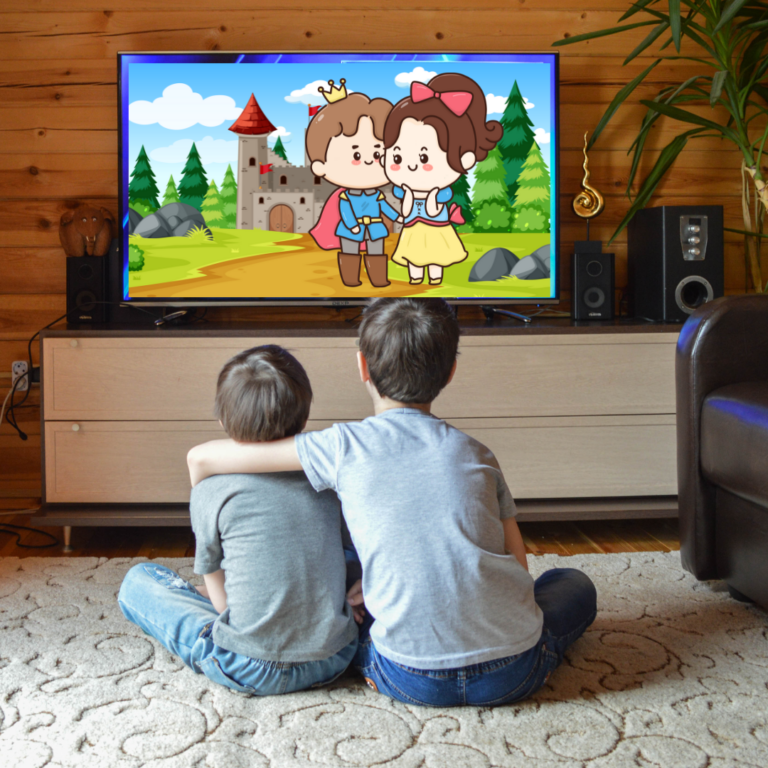How can parents and caregivers navigate kids’ crushes (same-sex or opposite sex), help kids avoid the idol of romance, and guide kids toward God’s wisdom for relationships?
So what exactly does it mean for younger kids to have a crush, and what should you do about it?
Navigating kids’ crushes
We probably all kinda know what a crush is, but here’s my definition: Crushes are strong feelings of attraction that last a short period of time (days to months to maybe a year), like a microburst of romantic desire. A child becomes infatuated with a particular person, idolizing them, admiring everything they do. This can be accompanied by a strong desire to be near the person physically – hugging, holding hands, cuddling, being close.
For kids younger than 8, crushes often arise out of deep admiration or friendship. You may have noticed your five-year-old is particularly enamored with the babysitter. He always wants to sit on her lap, hold her hand on walks, or always be in the same room. He has a “starry-eyed” look whenever he talks about her; she can do no wrong. We’d probably identify that as a crush. Your 7-year-old son may like spending time with his teacher, plus she’s kind to him and gives him treats and she smells nice. He develops a “crush” on her. Or your daughter may grow very close to her best friend. They see one another at school, at church, at playdates. They share many of the same interests. She develops a “crush.” At this age, crushes have nothing to do with sex.
Sexuality blossoms around the age of 9 or 10, meaning kids begin to feel sexual attraction. But, again, crushes at this age are not about sexual activity. If you were to ask your 9- or 10-year-old if they want to have sex with their crush, I’d be willing to bet that none of them would say yes. They feel a pull toward their crush. They may think romantic thoughts or wish they could get to know their crush better. They may want to hold hands or sit near their crush or they may be terrified for their crush to find out they exist. But they’re not thinking about sexual intercourse.
Slightly older kids–11, 12, 13–often crush on celebrities (just look at the popularity of boy bands!), fictional characters, older siblings of peers, or the cutest, most popular kid at their school. Again, crushes aren’t about desiring a real romantic relationship and all the ups and downs a coupled relationship entails. It’s an infatuation, an intense romantic feeling focusing only on the positives of the person and downplaying any negatives. Your child is likely wearing rose-colored glasses and daydreaming about the future they might have with their crush. They have an idealized version of the crush; they don’t see their crush as a real, flawed person.
Parents, we need to remember
-Crushes are normal; they’re part of normal child development.
-Crushes on adults/older teens are normal and may be more common than crushes on peers (the older sibling of a peer, an actor or actress, a musician, a famous sports player, a YouTube personality, their teacher, etc).
-Crushes on the same sex and opposite sex are commonplace, particularly for younger kids; a crush doesn’t necessarily point to sexual orientation, though it could be an early clue.
-You can’t talk your kid out of a crush. Crushes aren’t logical responses, and your child can’t control who they’re drawn to or who they feel attracted to.
-As needs for affection and intimacy are appropriately met, crushes will evolve into friendship or dissolve on their own.
How can parents respond to kids’ crushes?
Ask questions, avoid interrogation
What do you admire about [[crush’s name]]? What makes [[crush’s name]] a really good friend? How can you be kind to [[crush’s name]]? What are some things you have in common? Focus on the friendship aspect. Be interested in your child’s friends/crushes now and foster open communication so that when your child does begin to experience sexual feelings they won’t be afraid or ashamed to tell you about those, too.
Don’t make crushes into something they’re not
Sometimes, we think our 6-year-old’s crush on their classmate is cute. We get our child a heart-shaped box of candy to give to their crush on Valentine’s Day or we make comments like, “Maybe you’ll get married to Sasha one day!” or we encourage romantic displays of affection or we ask, “How’s your little boyfriend today?” or we turn shared play time into a pseudo date.
When we do those things, we’re effectively sexualizing our kids and making the crush into something it isn’t and something kids aren’t developmentally ready for. Plus, we’re teaching our kids to idolize romance and romantic companionship.
This matters particularly when it comes to same-sex crushes. When you think your 8-year-old’s crush on their opposite-sex friend is cute, but hasten to cut off a friendship when the crush is on a same-sex peer, you’re perpetuating the idol of romance and sexualizing your kids.
Be consistent in your response to all crushes.
Teasing, shaming, dismissing, and lecturing won’t help
These are very real, serious feelings to our kids. Dismissing crushes will lead your child to hide or stay silent about future crushes and teach your child that you can’t be trusted with their real feelings. Don’t tease or ridicule your child or the crush.
Don’t shame your child for experiencing a crush. Again, they didn’t choose to be attracted to their crush.
No need to lecture or tell your child “that could never happen” or “crushes never last.” While that may be true, it’s really not helpful, and it will only teach your child that you can’t be trusted with their feelings.
If the crush is a real person in their real life, don’t sabotage the relationship – don’t scold when your child and their crush share a hug, don’t cancel playdates, don’t embarrass your child in front of the crush, don’t change your routine to avoid the crush. This teaches your child to 1) hide their feelings from your and/or 2) that crushes are bad, to be feared, dangerous.
Teach your child how to have healthy boundaries
Teach your kids about healthy boundaries throughout their childhoods. Everyone needs to know what healthy boundaries look like, how to communicate them, and how to respect others’ boundaries. So work on that skill.
In the realm of crushes, it’s unlikely that a simple childhood crush would go sideways, but sometimes kids may get a little manipulative, try to imitate physical affection they’ve seen adults share, or become obsessive. Here’s a few ways to deal with that.
If you suspect your child is attempting to manipulate their crush into a relationship, you can say something like, “I know you really like Josh, but you shouldn’t try to make him like you, because he might feel uncomfortable and that’s not how real friends treat each other.”
If your child says something like, “Jenna said I had to be her boyfriend. I didn’t really want to, but I said I would because I don’t want her to be mad at me,” you can respond, “You are allowed to tell Jenna no. True friends always respect our nos. And you’re not responsible for someone else’s emotions.”
If your child tries to hug, hold hands, or kiss a crush, tell your child that it’s ok to play together at school but not to kiss or cross other physical boundaries. Teach your child that no means no. Teach your child about consent and boundaries, and respecting the boundaries of others.
If another child insists on physical affection, remind your child they can say no to anything they’re uncomfortable with (practice firm nos at home). And teach them how to get help if the crush chooses to cross boundaries or makes them uncomfortable.
Your child could become obsessive about their crush: planning out their day with their crush in mind, ditching friends, making the crush feel uneasy, near constant communication with the crush (via social media or text). Talk about ways to admire someone and what boundary-crossing can look like (constantly staring at your crush, following your crush, searching for personal details of the crush’s life or stalking their social media profiles, continuing attempts at communication when the crush has backed off). Take away devices or intervene as necessary.
A crush may become obsessed with your child. Encourage your child to tell the peer to back off or stop. You are the parent, the adult. Step in when you need to. And of course, if your child is pursued by an adult or teen or if another child is harming your child, you also need to get some help from the proper authorities.
Teach your child God’s wisdom
Our kids need us to teach them God’s wisdom for how they should steward their relationships. Culture isn’t going to teach them. And the church may not either. God gives that job to us, parents.
Same-sex crushes
Some of you are probably wondering, But my child has a same-sex crush! That means they’re gay and they’re thinking about gay sex! Surely I’ll respond to that much differently? You’re afraid of what this kind of crush means for your child, for your family, for you. You’re struggling.
Unfortunately, many Christian parents overreact and later regret it. Because parents know the pain many gay people have endured at the hands of Christians and churches, parents may overreact by limiting the friendship or by subtly trying to convince their child that they’re not gay.
But these reactions will only serve to stigmatize gay people, lead your kid to fear close same-sex friendships, teach your child that all intimacy is sexual and therefore must be avoided, and show your kid that you’re not a safe person to tell about their attractions and crushes.
And those tips I shared above? Those are the same tips I’m going to share for how to respond to same-sex crushes. Your response to all crushes should be consistent.
What can parents do when their child experiences a same-sex crush?
Ask questions, avoid interrogation
What do you admire about [[crush’s name]]? What makes [[crush’s name]] a really good friend? How can you be kind to [[crush’s name]]? What are some things you have in common? Be interested in your child’s same-sex friends/crushes now and foster open communication so that when your child does begin to experience sexual attraction she or he won’t be afraid or ashamed to tell you it, especially if your child discovers a persistent pattern of attractions to people of the same sex.
Don’t make the crush into something it’s not
Normalize attractions—we’re all attracted to a variety of people for a variety of reasons (otherwise we wouldn’t have friends at all!). Attraction to other humans, even humans of the same sex, is normal. Again, crushes aren’t about sexual activity; your young child isn’t thinking about gay sex.
If the crush is a peer or friend of your child, don’t sabotage the relationship–don’t scold when your child and their crush share a hug, don’t cancel playdates, don’t embarrass your child in front of the crush, don’t change your routine to avoid the crush. This teaches your child 1) to hide their feelings from you, 2) that crushes are bad, to be feared, dangerous, and 3) that they can’t have any kind of relationship with people of the same-sex, which in turn only increases desire.
Teasing, shaming, dismissing, and lecturing don’t help
Crushes often pass quickly, but shaming words or shock could have a negative impact that lasts for years.
A child’s same-sex crush could be the first indication of same-sex attraction. They may be just as surprised as you. And then they may feel intense shame, especially if they’ve grown up hearing that same-sex attraction is gross or if they’ve only heard gay people spoken about in negative ways, ways that are exclusive to God’s love. So don’t tease, shame, dismiss, or lecture.
Teach your child how to have healthy boundaries
Affirm your kid’s need for close same-sex friendships. Everyone needs healthy, intimate (not sexual) relationships with people of the same-sex. Teach your child about intimacy needs—emotional, physical, intellectual, spiritual—and help her or him seek out healthy relationships with family, friends, and God to meet those needs in healthy ways.
Teach your child about God’s wisdom for sexual stewardship
When we teach in theologically accurate and compassionate ways about God’s good design for intimacy, family, Christian marriage, vocational singleness, discernment, sex, and sexuality, our kids will be able to spot any counterfeit the world offers. Plus, they’ll know that God loves them and has good things for them regardless of who they’re attracted to.
Help your child cultivate healthy friendships with peers of the same sex, and help them put their feelings into a different category–what they really need, really desire is healthy intimacy. And that’s true for our kids who have opposite-sex crushes as well.
Help your children avoid the idol of romance
What does romance idolatry look like? It looks like
-”I want to get married, so God must want me to get married.”
-Believing that the purpose for marriage is companionship and mutual fulfillment.
-Believing that friendship can’t provide intimacy like marriage can.
-Believing that romance/a romantic partner will fill me up, will satisfy my longing for love and companionship, will take away my painful emotions.
-Saying, “When you get married…” or “I’m praying for your future spouse” (assuming marriage for everyone)
-Highlighting Bible stories, holidays, celebrations that center only marriage and/or nuclear family.
-Encouraging teens to indulge in romantic relationships as much as they want, as long as they don’t cross certain lines.
But romance isn’t promised to anyone by Scripture. God doesn’t guarantee any of our kids a spouse.
Some of our kids, for various reasons, won’t get married. And God wants to call some of our kids to a lifetime vocation of singleness for the sake of the kingdom, freed from the responsibilities of raising kids to instead “be fully concerned with the things of the Lord” as 1 Corinthians reminds us.
So what can you do to lead your child away from the idol of romance?
-Remind your child that God does not owe or promise them romance or a spouse.
-Teach your kid what God designed Christian marriage and vocational singleness for.
-Model finding relational intimacy in friendships and chosen family; if your child tries to get all of their intimacy needs met by one person, they’ll kill the relationship. A spouse was never meant to carry the full weight of providing for every one of their partner’s intimacy needs. It’s impossible for one person to provide all the relational intimacy we need. God created us to be in community, and those who are in a couple still need a wider community in order to thrive relationally.
-Ask, “What are you interested in and passionate about? What kingdom work do you think God might one day call you to?”
-Say, “If God calls you into a Christian marriage…” and speak positively about Christian singleness.
-Highlight Bible stories, holidays, celebrations that center chosen family, Christian family, and single people as much as the ones that center nuclear families and marriages.
-Encourage teens/young adults to discern their relational vocation (Christian marriage or vocational singleness) with God and trust that He knows which vocation is best for them.
Guide your kids toward God’s wisdom
It’s really important to talk to kids about crushes, romance, and God’s wisdom for relationships. All throughout your kid’s childhood, have intentional conversations about God’s wisdom for their relationships.
Two of the most important things:
1. Teach accurately about Christian marriage and vocational singleness and family
2. Expect your kids to discern
Teach accurately about Christian marriage and vocational singleness and family
Christian marriage is a calling between one Christian man and one Christian woman in covenant relationship for life for the sake of the kingdom: to embody the gospel and be open to raising children. Vocational singleness is a committed, lifetime calling to celibate singleness for the sake of the kingdom: to do kingdom work, raise up/mentor spiritual children, and embody the gospel.
Those definitions aren’t ones we typically give our kids, and they certainly aren’t what our kids are picking up from YouTube, TikTok, Disney movies, or school. So we have to be really intentional about teaching our kids God’s designs for Christian marriage and vocational singleness.
The purpose of Christian marriage isn’t romance and making you happy and fulfilling all your daydreams. Christian marriage is about pointing others to Jesus and His relationship with His Bride, the Church. It’s for the sake of the kingdom. It’s the space God designed for kids to be raised up in the gospel. And the purpose of lifetime Christian singleness isn’t so that you can have more time and money for yourself. It isn’t so you can be free from difficult kingdom work like raising kids. Vocational singleness is specifically for the sake of the kingdom. It’s meant to point others to the love we find in God’s family, a love that is so much more true and real than any love another human could offer us. Vocational singleness is for the purpose of deep kingdom work done with undivided attention.
Teach your kids what God’s family is all about
We all need family, whether God calls us to Christian marriage or to vocational singleness. We all need the love and belonging family provides. God’s family isn’t exclusive; no one is left out in God’s family. Those called to singleness for the sake of the kingdom should be able to find just as much family in our churches as married couples find with their spouses. We’re all made for committed, permanent, lived-in family.
Help your kids expand their definition of family–it’s not only the people we’re biologically related to or married to; our family is God’s household, the people of God. To that end, we must teach kids how to be in relationship with other humans.
Your child must learn how to appropriately express affection, how to encourage and support friends, how to resolve conflict without running away or ending the relationship. Help your kids learn how to be in relationship, not just pursue a romantic relationship.
Teach your child about discernment
How will our kids figure out whether God wants them to pursue Christian marriage or vocational singleness? Discernment.1
Discernment means taking a decision to God in prayer and asking God what His will is for your life, submitting your own desires and preferences to His.
The process looks something like this: Bringing a concrete question before God (in this case, the question of which relational vocation to pursue); working to eliminate fears, biases, and other blocks that could hinder your prayers; knowing what your options are and considering the practical implications of each option; considering your current circumstances and what the future would look like with each option; seeking advice and support from spiritual mentors; coming to a potential conclusion; holding that conclusion before God with open hands; moving forward in faith; and evaluating the fruit of the choice after action is taken.
Discernment usually isn’t a quick process. Your kids will likely start discerning in late high school/early college and may discern through their 20s and into their 30s or longer. Continue to support your child for as long as they need to discern which relational vocation God wants to give them.
Why should you set up the expectation that your kids will one day discern their relational vocation? Because one’s relational vocation is given or called, not chosen; we don’t just take what we want. God has a preference for each of our kids. He knows our kids best and knows which relational vocation will be best for them and for His kingdom. He wants to communicate that preference to them.
Marriage isn’t the default path that God may call us away from. No, we’re all born into a temporary state of singleness and from there, God either calls us into a permanent vocational singleness or into a permanent Christian marriage. So teach your kids how to work through a process of prayerful discernment.
Get access to the full recording and discussion guide for this webinar in Equip’s on-demand Digital Leaders Course.
- If you’re not familiar with the process of prayerful discernment, I suggest Mark Thubodeaux’s book, God’s Voice Within. It is a very accessible guide to developing a practice of prayerful decision making. ↩︎







Laura
Great job done with this! I will be sharing.
Amber Carroll
Thank you, Laura! I hope it’s helpful to all who read it.